When Corey Johnson came out as a teenager, the future New York City Council speaker got a lot of attention: The New York Times profiled him in 2000 and Anderson Cooper produced a segment about him for the ABC news magazine “20/20” soon after.
Johnson, a captain on his high school football team, told his teammates that he was gay when he was 17. The decision of a young, gay athlete to come out in a working-class Massachusetts town, as well as his team’s acceptance, was a compelling story. In addition to the press coverage, Johnson spoke to a crowd of 400,000 people at the Millennium March on Washington.
However, most coming out stories don’t make national news, and most young, gay teenagers don’t get invited to share their story in front of hundreds of thousands of people. So City & State asked other LGBT policymakers in New York to recount their experiences, and how identity has shaped their politics. Their responses have been edited for clarity and brevity.
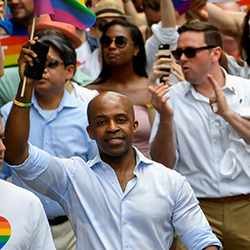
Counsel to the Governor Alphonso David
“I was basically asked the question by my father and answered it correctly. So I came out to my family in my early 20s but did not come out professionally until 2005. Coming out personally was difficult because it threatens you to your core when you come out to family members who you are fearful may not accept you and who may reject you and may disown you. I come from a very traditional family where, in Liberia, same-sex relationships are unlawful. Professionally, there were different challenges. I came out in the early 2000s … and when I decided to join Lambda (Legal), a friend of mine from law school said, ‘This will destroy your career because it will be much more difficult for you to succeed. Gay people do not succeed in our profession, unfortunately.’ But it was more important to me to embrace my identity in all of its different permutations than living in fear. And after spending three years at Lambda, I thought I could achieve greater impact in government than outside of government. And my identity certainly played a huge role in that.”
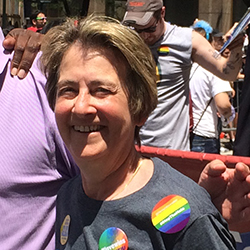
Assemblywoman Deborah Glick
“I came out in maybe ’72 or ’73. It wasn’t exactly a decision. I was involved with the Lesbian Liberation Committee of the Gay Activists Alliance. There was a Sunday evening program called “New York Illustrated” and somehow they were doing a profile of the group and most people did not want to be on screen, but I was young and I said, ‘Sure.’ I at least had to come out to my family in advance. So I sort of came out very publicly in a very early time in the movement, although I will say that for years in the early days of the movement, you were constantly coming out. At a certain point, we wanted to elect an openly gay person. And so I said I would take a shot for the Assembly. For the first two years, I never wore pants. I wore skirted suits only to break the stereotype. Part of it was playing a certain role to undermine the stereotypes that clearly were part of the mindset of many members. Then-(Assembly) Speaker Mel Miller did a me a great favor. He was asked by a reporter, ‘How does it feel to have an avowed lesbian in your conference?’ And without missing a beat, he said, ‘I’m only worried about the avowed morons in my conference.’ And that humor and that pretty overt support was very important.”
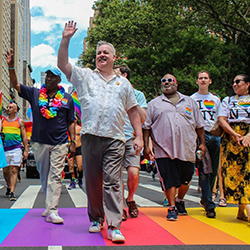
Assemblyman Daniel O’Donnell
“My story is fairly unique in that I met my now husband on the first day of college when I was 17 years of age, and we’ve been together for 38 years. My coming out process was really an acknowledgement that I was in love with a man and that had never happened to me before. That is not most LGBT people’s stories, but that’s my story. So I was out before my sister was, (who) was much more famous than I ever will be, and at times it was difficult because I would get heckled in gay pride parades, ‘Where’s your sister, where’s your sister?’ When I first ran for office someone said to me, ‘I don’t like you and I don’t like your sister,’ and I said, ‘Which sister do you know?,’ and that shut them up for a little while – I have two sisters. In the end, within internal dynamics in families, it makes it complicated. There are five of us; there’s not just two of us. But I can assure you that I am, and she is, much happier being out than being in.”
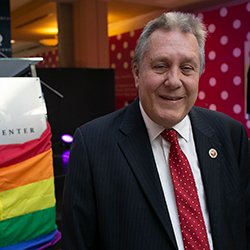
New York City Councilman Daniel Dromm
“I had a very public coming out in 1992, when I was a teacher in School District 24 at P.S. 199. At that time, LGBT groups got together and decided what we needed to do was to write a curriculum that preached tolerance of New York’s diverse communities, especially the LGBT family. When it was released in 1992, there was a lot of controversy and my school board president, Mary Cummins, was the main organizer against it. I knew I had a weapon in my hand because I was a pretty popular teacher and I thought that if I disclosed the fact that I was gay, because I had already told my family, I could push back on what the school board was doing. I went to a meeting at the Lesbian and Gay Community Services Center in Manhattan and the meeting was called to discuss how the community was going to fight back against this opposition to the rainbow curriculum. And I raised my hand, and said I’m a teacher in District 24. All those cameras and news reporters came zooming right toward me. And they were like, ‘Oh you’re an openly gay teacher in that district?’ And I said, ‘Yes.’ After that, the parents supported me, the principal was fairly supportive, but the school board members tried to remove me from my teaching position. And they came, and they investigated me, and they wrote letters to the central school board, and they really wanted me removed from my teaching position. Fortunately they were never really able to do that.”
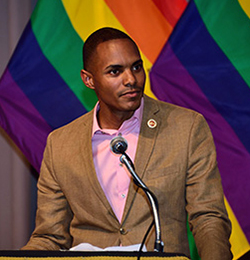
New York City Councilman Ritchie Torres
“I remember first coming out during my sophomore year in high school. I had a young teacher, and in a pre-Facebook world, I found out he was gay. I never had somebody in my life who was gay. And so when I approached him, I spontaneously decided to come out. It was the first time I had acknowledged to a person that I was gay. And then, at a later time, during a public debate about marriage in the Lehman High School library, I had what I call a Jim McGreevey moment: I publicly came out as a gay American. Again, it was a spontaneous decision. And then my coming out process was three steps forward, two steps backwards. For a period of time, I largely kept my sexuality to myself, and then in 2010, I came out to my colleagues at my council office. I was then an employee for Council member Jimmy Vacca. And then when I ran for public office, that was the most definitive moment of coming out, when I made a decision to be fully open and honest about who I am. I’m a public figure, and there’s going to be no ambiguity about my self-identification.”
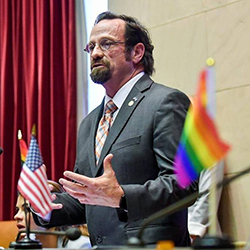
Assemblyman Harry Bronson
“I came out in my mid-20s and I had gone to college, had graduated from law school, had just begun my law career and had been in a relationship that didn’t last. And I told myself that since I could not have my family as part of that transition and separation, if you will, I had basically told myself I’m not going to go through that again without my family being at my side. When I told my mom, her response was, ‘Oh no.’ She’s a very religious woman. She ultimately drove back to (the) Binghamton area and immediately called me and said she doesn’t understand, she didn’t know if she would ever understand, but that I was her son and she would love me no matter what. I was the first openly gay Monroe County legislator. When I tried to become minority leader, there was a lot of pushback – unfortunately within my own party – about whether or not the county was ready for an openly gay elected official. We overcame that. And then when I ran for the Assembly, there have been hints, not real assertive stuff. For the most part, the gay piece was tied in with other progressive ideals that I push.”
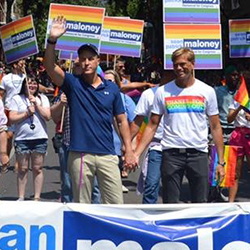
Rep. Sean Patrick Maloney
“I can remember standing in the driveway of the house I lived in during law school and thinking, ‘This is who I am and there’s not a thing in the world wrong with it.’ And from that point forward, it was all details. My folks were conservative, very religious Irish Catholics. This was not on their agenda. But they came around. It takes time and it takes real love to overcome those different perspectives. I think that if LGBTQ people have one thing to offer in terms of our current politics, it is that we know that sometimes, if you stick with people who disagree with you, they come around. When I was young, I remember thinking that there would be things I couldn’t do in politics because of who I was, and thinking that I had to hide who I was if I wanted to be in politics. There were just jobs that you knew were going to be impossible if you were honest about who you were, and that creates a lot of fear and a lot of hesitation to be honest about who you are. But that’s why I think that coming out is so powerful. It’s a decision that the world is going to have to make room for you, and you realize pretty quick that that’s going to take a lot of work.”
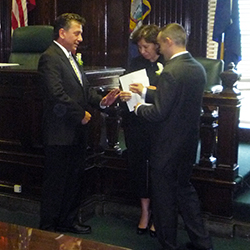
Assemblyman Matthew Titone
“I actually have a pretty funny story. Coming out to my parents and stuff like that happened first, but the best story is back in 2006. The chairman of the Democratic Party on Staten Island, John Lavelle, had asked me to run for state Senate. I accepted the nomination and John and I were at this really big event with I would say close to 300 people at it. And he pulls me aside and he says, ‘Matt I got some really bad news, gotta talk.’ I say, ‘OK John, what’s going on?’ He looks so nervous and he says, ‘I’m so sorry but I got this word that the Republicans are going to do some really bad opposition campaigning against you.’ I said, ‘Alright John, so what is it?’ He said, ‘They’re going to out you.’ And I said, ‘What do you mean?’ ‘They’re gonna let everyone know that you’re gay.’ I go, ‘Really?’ He goes, ‘Yeah.’ ‘John, can we review this for a moment? First of all, you know I’m gay right?’ He goes, ‘Yeah.’ ‘And you know that everybody here knows that I’m gay, including, then my partner now my husband, Josh?’ He goes, ‘Yeah.’ ‘And you know my entire family knows I’m gay right?’ He goes, ‘Yeah.’ ‘And all my friends know I’m gay, right?’ ‘Yeah.’ So I say, ‘John, when you say they’re going to out me, did you find out exactly what they meant?’ So he looked at me and goes, ‘Oooh.’”
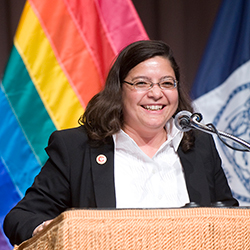
Former New York City Councilwoman Rosie Mendez
“When I was running for office, it was important to do so as an out individual. There’s a story that I’ve told, when I was chief of staff to Margarita López. An elderly couple who I helped with a housing problem, they came into the office and they had their Bible in a little leather binder with a zipper and I took the case. A year later, they came to visit with another little problem that was easily resolved, and they said they wanted to tell me something. They said you know – in Spanish, they didn’t speak English – just wanted you to know we’ve never really been in agreement with you and Margarita and your lifestyle but we voted for you – I was a district leader – because you were always there helping the community. You also need to know that our grandson is gay. And when he told his parents, they beat him up and threw him out of the house. And they said, we went looking for him. They said he lives with us and he takes care of us and we take care of him. And he’s our grandson and we love him. And we need to thank you and Margarita for that. Sometimes you make changes in office in a sweeping way by passing law, and sometimes you make changes on a very individual basis by changing people’s minds.”
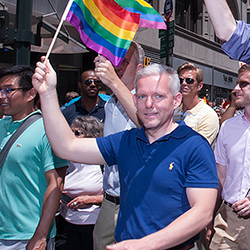
New York City Councilman Jimmy Van Bramer
“The Saturday before the Pride Parade, which is always the last Sunday in June, back then there was a big rally the day before. The organizer of the youth group invited us to go, both to the rally and to the parade. I told him I couldn’t go to the parade because I was afraid my mother would see me on TV, which is somewhat comical now because I’m a politician and I like to be on TV, and also my mom probably would not have seen me on TV. I went to the rally on Saturday in Central Park and I remember they were handing out the pride guide, which they still hand out, which was all the gay and lesbian organizations in the state of New York. I took that home with me. I tore off the cover because it had lots of gay and lesbian pictures and images on it, and I didn’t want my mother to see that. I looked through the book and I looked at all these gay and lesbian groups that existed and there were hundreds and hundreds of groups and I kept looking for one I thought I could join. I had just come out to myself really at this point. I came across a group that said Gay and Lesbian Independent Democrats. I thought, ‘Well, I know I’m gay and I know I’m a Democrat, so maybe this is the group for me.’”
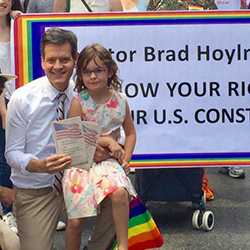
State Sen. Brad Hoylman
“I came out in graduate school where I was away, far away from home, in fact overseas. When I came out I felt an overwhelming compulsion to tell all my classmates. So I jumped on a bike, went to their apartments one by one, informed them of what I thought was breaking news but in reality, most of them just shrugged and said rather meekly, ‘congratulations.’ It goes to show you that often times people know you better than you know yourself. … When I moved to New York City, I was out in politics. I joined Gay and Lesbian Independent Democrats association, which is one of the first political organizations in which I became a member. So I identified very early on in my political experience with being LGBT. … To be the best public servant, you have to be honest. People want you to be candid and forthright not just about issues about who you are as a person and you’re hiding something as integral as your sexual identity? Voters catch on.”
NEXT STORY: Emma Wolfe: Leader of the pack


